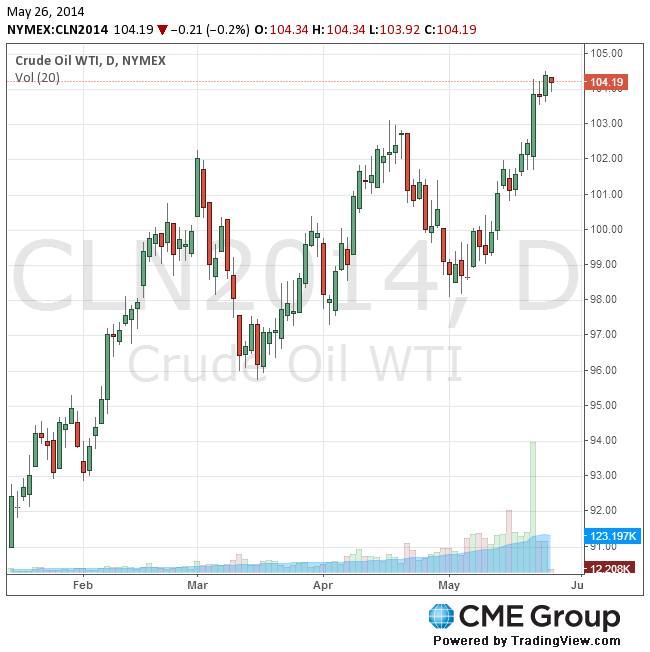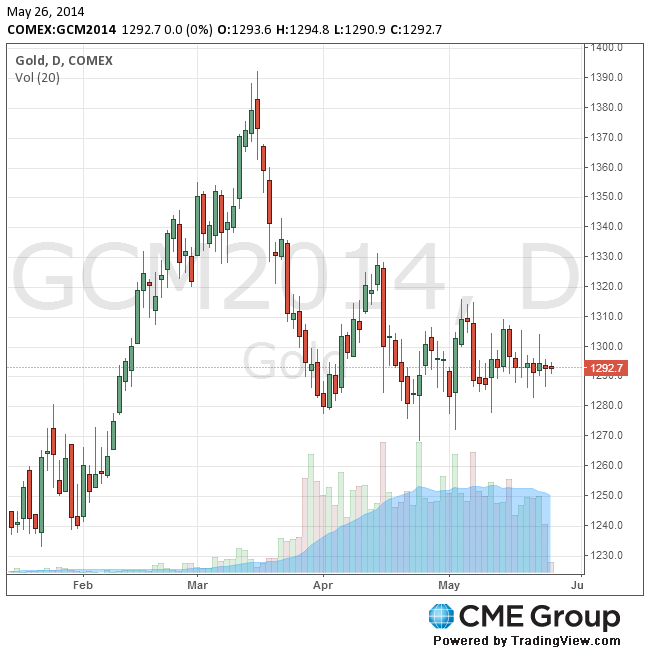Notícias do Mercado
-
16:40
Oil fell
Brent crude fell amid speculation that Ukraine’s election of a new president may help ease months of tension with Russia, the world’s biggest energy exporter. West Texas Intermediate slid in New York.
Futures dropped as much as 0.7 percent in London. Ukraine elected billionaire Petro Poroshenko as president yesterday, handing him the task of stemming separatist unrest in the country, a conduit for Russian oil and natural gas supplies to Europe. China, the second-largest oil user globally, announced plans to slow its pace of energy consumption.
“There’s been quite a political vacuum in Ukraine, and that should begin to get resolved,” Ole Hansen, head of commodity strategy at Saxo Bank A/S in Copenhagen, said by phone today. “News about Ukraine has been helping to bring down prices a bit,” he said, describing Poroshenko as “ someone who can sit down with the Russians to try to work out their differences.”
Brent for July settlement declined as much as 79 cents to $109.75 a barrel on the London-based ICE Futures Europe exchange and was at $109.99 at 1:47 p.m. London time. The contract gained 18 cents to $110.54 on May 23. The volume of all futures traded was about 74 percent below the 100-day average. Prices have lost 0.7 percent this year.
WTI for July delivery decreased as much as 43 cents, or 0.4 percent, and was at $104.10 a barrel in electronic trading on the New York Mercantile Exchange. The U.S. benchmark crude traded at a discount of $5.92 to Brent. The spread closed at $6.19 on May 23, the narrowest in five weeks.

-
16:20
Gold stabilized
Gold holds below $ 1,300 an ounce in electronic trading in New York against the backdrop of conflicting signals : the expected reduction of stimulus measures by the Federal Reserve System and the conflict in the Ukraine.
Gold fell on Friday to 0.1% after reports that sales of new homes in the U.S. rose by the largest value since October. Trading platforms in the U.S. and the UK are closed today due to public holidays .
The gold market has fallen in the past year by 28% due to expectations that the Federal Reserve in connection with the economic recovery will begin reducing the bond buyback program . Since the beginning of the year the prices of precious metals rose 7.6 %, including because of strained relations between Russia and Ukraine.
Kazakhstan , Belarus and Turkey in April increased gold reserves , and Mexico - and cut , said the International Monetary Fund .
" Now investors have little reason to invest in gold - says Zhu Sytsyuan analyst Chinese GF Futures Co. - Bidding will be sluggish due to the holidays in the U.S. and in the absence of new macro data . Situation in Ukraine continues to provide background support to the market ."
Assets of SPDR Gold Trust, the biggest gold exchange-traded fund , May 23, has not changed, and on May 21 fell to 776.89 tons , or the lowest level since December 2008. In China, the trading volume indicative contracts for spot delivery on the Shanghai Stock Exchange on May 23, decreased to 9907 kilograms of gold , or the lowest level since April 30.
The cost of the June gold futures on the COMEX trading today in the range of $ 1290.90 - $ 1294.80 per ounce.

-
00:30
Commodities. Daily history for May 23’2014:
(raw materials / closing price /% change)Gold $1,293.40 -1.50 -0.12%
ICE Brent Crude Oil $110.54 +0.18 +0.16%
NYMEX Crude Oil $104.39 +0.66 +0.64%
-